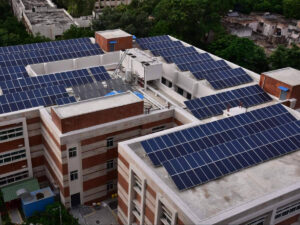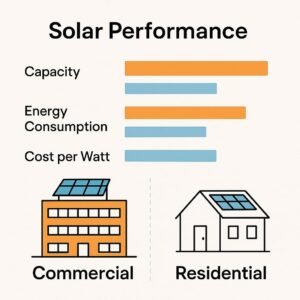Commercial buildings represent ideal platforms for solar energy systems, often delivering superior performance and returns compared to residential installations. With extensive rooftop space, consistent daytime energy consumption, and economies of scale, commercial solar installation in Dubai presents compelling opportunities for businesses seeking sustainable energy solutions.
Understanding how solar panels function on commercial buildings helps business owners make informed decisions about renewable energy investments that can transform operational costs while supporting environmental goals.

The Commercial Solar Advantage
Commercial buildings possess several characteristics that make solar installations particularly effective. Large, flat rooftops provide ample space for extensive solar arrays without the geometric constraints common in residential applications.
Commercial energy consumption patterns align naturally with solar production. Peak electricity demand typically occurs during business hours when solar panels generate maximum power, creating high self-consumption rates and immediate bill reductions.
The scale advantages of commercial installations drive down per-watt costs while enabling sophisticated monitoring and control systems. These factors combine to create favorable economics for businesses evaluating renewable energy options.
Why Commercial Solar Installation in Dubai Thrives
Dubai’s commercial market offers exceptional conditions for solar success. The emirate’s abundant sunshine, combined with high commercial electricity rates, creates compelling investment opportunities for businesses across all sectors.
DEWA’s Shams Dubai program specifically accommodates commercial installations with net metering benefits that maximize solar value. Businesses can offset expensive peak-hour consumption while earning credits for surplus production during optimal solar conditions.
The stable regulatory environment and government support for renewable energy provide confidence for long-term investment planning. This policy consistency helps businesses justify solar investments with predictable return projections.
Commercial vs. Residential Solar Performance

Commercial installations typically achieve higher capacity factors due to better equipment and installation quality. Professional-grade inverters and monitoring systems optimize performance while reducing maintenance requirements.
Commercial buildings often feature optimal solar orientations with minimal shading from adjacent structures. This advantage, combined with professional system design, maximizes energy production throughout the year.
The economies of scale in commercial projects enable higher-quality components and more sophisticated system designs that residential installations cannot justify economically.
Types of Commercial Solar Applications
Rooftop Systems
Flat commercial rooftops provide ideal platforms for solar installations. Ballasted mounting systems eliminate roof penetrations while providing adequate wind resistance and optimal panel angles.
Large unobstructed roof areas enable significant solar capacity installations. A typical warehouse or office building can accommodate hundreds of kilowatts of solar capacity, generating substantial electricity volumes.
Rooftop installations minimize ground-level space requirements while providing easy access for maintenance and monitoring. This arrangement suits most commercial applications without interfering with business operations.
Ground-Mount Systems
Businesses with available land can consider ground-mounted solar farms that may offer lower installation costs and easier maintenance access. These systems provide maximum flexibility for optimal panel orientation and spacing.
Ground-mount installations can accommodate tracking systems that follow the sun throughout the day, increasing energy production by 15-25% compared to fixed installations.
For industrial facilities with large land holdings, ground-mount systems can provide extensive renewable energy capacity that transforms facility energy profiles.
Carport and Canopy Installations
Solar carports provide dual benefits by generating electricity while protecting vehicles and creating covered spaces. These structures are particularly popular for retail centers, office complexes, and manufacturing facilities.
Building-integrated photovoltaic (BIPV) systems incorporate solar panels into architectural elements like facades or awnings. While typically more expensive, these installations can provide aesthetic and functional benefits beyond energy generation.
Creative installations on pergolas, walkway covers, and other structures maximize solar potential while adding functionality to commercial properties.
Financial Benefits for Dubai Businesses
Operational Cost Reduction
Commercial solar installation in Dubai typically reduces electricity costs by 30-70% depending on system size and energy consumption patterns. These savings flow directly to bottom-line profitability.
Dubai’s tiered electricity pricing structure makes solar particularly valuable for high-consumption businesses. Solar generation displaces the most expensive peak-rate electricity, maximizing savings potential.
Predictable solar production enables better financial planning with stable energy costs. This predictability helps businesses hedge against future utility rate increases.
Cash Flow and Return Analysis
Commercial solar projects typically achieve payback periods of 4-6 years in Dubai, after which they generate positive cash flow for 15-20 additional years. This extended benefit period creates substantial cumulative value.
Monthly solar loan payments are often lower than electricity bill savings, creating immediate positive cash flow. This favorable financing structure makes solar accessible without significant capital investment.
Accelerated depreciation benefits allow businesses to recover solar investments quickly through tax advantages, improving overall project economics.
Technical Considerations
System Sizing and Design
Commercial solar systems require professional engineering to optimize performance and ensure grid compatibility. Proper sizing balances maximum energy production with economic constraints and electrical system capacity.
Load analysis determines optimal system size based on historical consumption patterns and future growth projections. This analysis ensures solar production aligns with actual energy needs.
Electrical integration requires careful coordination with existing systems to ensure safety and reliability. Professional design addresses voltage compatibility, protection systems, and monitoring requirements.
Grid Integration Requirements
Commercial installations must comply with utility interconnection standards that ensure grid stability and safety. These requirements typically include advanced inverter functions and communication capabilities.
Power quality considerations become more important at commercial scale. Proper system design minimizes harmonics and power factor issues that could affect other electrical equipment.
Utility approval processes for commercial systems are more complex than residential applications, requiring detailed documentation and coordination with DEWA representatives.
Installation Process and Timeline
Project Development Phases
Commercial solar projects follow structured development processes that typically span 8-16 weeks from initial consultation to system commissioning. This timeline includes design, permitting, procurement, and installation phases.
Professional project management coordinates multiple stakeholders including engineers, installers, utility representatives, and financing partners. This coordination ensures smooth project execution and timely completion.
Staging minimizes business disruption during installation. Most commercial installations can proceed during normal business hours with minimal impact on daily operations.
Quality Assurance and Testing
Commercial installations require comprehensive testing and commissioning to ensure optimal performance and safety. This process includes electrical testing, performance verification, and safety system validation.
Documentation requirements for commercial projects are more extensive than residential installations. Proper documentation protects warranty coverage and supports ongoing maintenance requirements.
Professional commissioning ensures systems operate at design specifications from day one. This quality assurance process identifies and resolves issues before they affect performance or safety.
Partnering with the Right Solar Company in Dubai
Selecting Qualified Contractors
Commercial solar success depends heavily on contractor selection. Qualified companies possess the technical expertise, financial stability, and experience necessary for complex commercial projects.
Yanvi Solar exemplifies the professional standards required for successful commercial installations. Their experience with Dubai’s commercial market ensures projects meet technical requirements while delivering projected financial returns.
Verify contractor credentials including DEWA approvals, insurance coverage, and relevant project experience. Quality contractors provide references from similar commercial installations for verification.
Comprehensive Service Offerings
The best commercial solar providers offer turnkey services including feasibility analysis, system design, permitting, installation, and ongoing maintenance. This comprehensive approach simplifies project management while ensuring optimal outcomes.
Professional monitoring and maintenance services protect long-term performance and investment returns. These services identify performance issues early while ensuring compliance with warranty requirements.
Financing partnerships enable flexible payment structures that align with business cash flow requirements. Quality providers work with established financing partners to offer competitive terms.
Long-Term Performance and Maintenance
Performance Monitoring
Commercial solar systems benefit from sophisticated monitoring systems that track performance at individual panel levels. This detailed monitoring enables predictive maintenance and performance optimization.
Real-time monitoring identifies performance deviations quickly, enabling prompt corrective action. This proactive approach minimizes energy production losses while extending system life.
Historical performance data supports warranty claims and helps optimize maintenance schedules. Professional monitoring services provide regular performance reports and recommendations.
Maintenance Requirements
Commercial solar systems require regular maintenance to ensure optimal performance, particularly in Dubai’s dusty environment. Professional maintenance programs handle cleaning, inspections, and component replacement as needed.
Preventive maintenance schedules minimize unexpected downtime while protecting equipment warranties. These programs typically include quarterly inspections and bi-annual comprehensive maintenance.
Professional maintenance teams understand commercial system complexity and safety requirements. Their expertise ensures maintenance work meets professional standards while minimizing business disruption.
Conclusion: Commercial Solar Success in Dubai
Commercial buildings provide exceptional platforms for solar energy systems that deliver significant financial and environmental benefits. With proper planning, quality installation, and ongoing maintenance, commercial solar installation in dubai consistently exceed performance expectations.
Dubai’s favorable solar resource, supportive policies, and competitive commercial market create ideal conditions for solar investment success. Businesses that act promptly can capitalize on current incentives and equipment costs while securing decades of energy savings.
The question isn’t whether solar works on commercial buildings—it’s whether your business can afford to miss this opportunity. Partner with qualified solar installation in Dubai professionals to explore how renewable energy can transform your operational costs while supporting sustainability goals.
Take the first step by contacting experienced commercial solar providers for comprehensive feasibility analysis. Your commercial building could become a renewable energy asset that delivers value for decades while supporting Dubai’s clean energy vision.